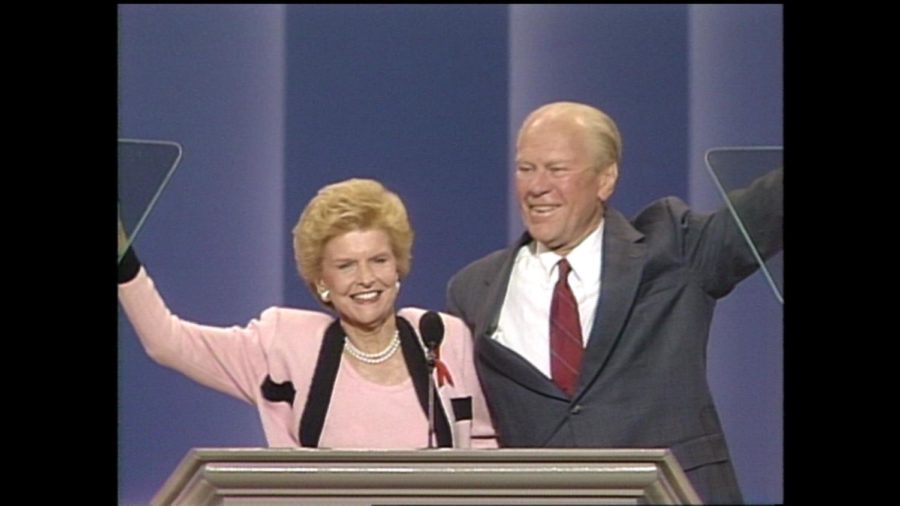Former first lady Betty Ford dies at the age of 93
Photo courtesy of: CNN Wire Service
Betty Ford seen in Houston, Texas with husband, the late President Gerald Ford in 1992. Betty Ford, a co-founder of an eponymous addiction center in California, died Friday, July 8, 2011 at 93.
July 8, 2011
Betty Ford, the widow of late President Gerald Ford and a co-founder of an eponymous addiction center in California, has died at the age of 93, said the director of the Gerald R. Ford Presidential Library and Museum.
Ford died Friday evening with family at her bedside, said a family member.
Elaine Didier, the director of the Grand Rapids, Michigan, museum, confirmed Ford’s death.
No other details were immediately available. The family is expected to release a statement later Friday or Saturday, Didier said.
Condolences began pouring in soon after news broke about her death.
President Barack Obama remembered the former first lady as a “powerful advocate for women’s health and women’s rights” and someone who “helped reduce the social stigma surrounding addiction.” His predecessor, George W. Bush, added that “because of her leadership, many lives were saved.”
Some of the many others offering praise and sympathy included Nancy Reagan, calling Ford “an inspiration,” and former presidents George H. W. Bush, describing her as a “wonderful wife and mother, a great friend and a courageous first lady,” and Jimmy Carter saying she was “a close personal friend” and “a remarkable political spouse.”
Born Elizabeth Anne Bloomer in Chicago, she grew up in Grand Rapids. At the age of 21, she moved to New York City to work as a dancer and model before. She returned to the Midwest two years later.
She divorced William Warren in 1947 after a five year marriage, and one year later married Gerald Ford — a former star football player at the University of Michigan, decorated U.S. Navy veteran and budding Republican politician. That year, the woman now known as Betty Ford campaigned with her new husband on his successful campaign to become a U.S. congressman from Michigan. She gave birth to three sons and a daughter over the course of their 58-year marriage.
The family moved to Washington, where Gerald Ford served in the Capitol for 25 years prior to his being tapped in 1973 as then-President Richard Nixon’s vice president in place of Spiro T. Agnew.
Just more than 10 months later, Betty Ford became first lady when her husband was sworn in as the 38th president of the United States. Gerald Ford took office after Nixon resigned in the wake of his impeachment following the crisis and cover-up of the break-in at the Democratic National Committee’s headquarters at the Watergate complex in Washington.
Betty Ford soon made headlines, holding news conferences and publicly discussing her diagnosis with breast cancer. The first lady talked about abortion, pre-marital sex and equal rights in an interview with CBS’ “60 Minutes” in 1975 — the same year Newsweek named her its “Woman of the Year.” According to the Ford library and museum’s website, her candidness initially drew some criticism, but in a short time, 75 percent of Americans approved of her in public opinion polls.
But in 1978, just more than one year after leaving the White House after her husband lost his campaign to remain president, Ford made headlines of a different kind. She entered the Long Beach Naval Hospital to be treated for alcohol and prescription painkiller abuse.
That same year, she published the first of two autobiographies, entitled “The Times of My Life.” Ford would go on to become a high-profile example of someone who battled substance abuse issues, as well as a tireless advocate for drug and alcohol treatment.
“My addiction was a combination of alcohol and the prescription drugs that … both were a part of my life, but they did not become a problem until they overrode my common sense,” Ford told CNN’s Larry King in 2003. “I didn’t know what was happening, I just knew that I felt great and the pain was gone.”
Her work paid dividends in October 1982 when, along with Leonard Firestone, she opened the Betty Ford Center in Rancho Mirage, Calif. To this day, the center remains one of the most well-known and respected places nationwide for treatment of alcoholism and other drug dependencies.
Ford also fought to promote awareness and research on breast cancer, with the Susan G. Komen Breast Cancer Foundation eventually naming an award in her honor.
She earned numerous honors over her life, including a Presidential Medal of Freedom in 1991 and the Congressional Gold Medal eight years later.
Gerald Ford died on Dec. 26, 2006, at the couple’s home in Rancho Mirage. He was 93.







